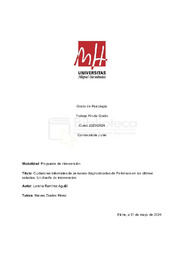Resumen :
La enfermedad de Parkinson (EP) se trata de una enfermedad neurodegenerativa crónica
y progresiva que afecta al Sistema Nervioso Central (SNC) que se caracteriza por una
afección que deriva en una disminución significativa de la dopamina, un neurotransmisor
crucial para el control del movimiento y la coordinación. Esta enfermedad no evoluciona
de forma homogénea para todas las personas que la padecen siendo varios factores los
que pueden influir en su curso. A pesar de que existen diversos tratamientos enfocados
en las personas que padecen esta enfermedad, en ocasiones las personas que están a
cargo de su cuidado no reciben la atención necesaria. Dado que esta es una enfermedad
de curso progresivo y muchos de estos pacientes se encuentran en casa, cuidados a
menudo por una persona cercana, se considera necesario realizar una intervención
personalizada para estos cuidadores informales. Esta propuesta de intervención consta
de siete sesiones diseñadas para apoyar a los cuidadores informales de personas con
Parkinson en los últimos estadios. La primera sesión busca aumentar la empatía de los
participantes hacia las personas con Parkinson. En la segunda sesión nos centramos en
reconocer y comprender las emociones tanto de los pacientes como de los cuidadores,
además de compartir experiencias y estrategias de afrontamiento. La tercera sesión
destaca la importancia de la comunicación no verbal para crear un ambiente de apoyo. La
cuarta sesión subraya que todas las emociones son válidas y deben ser aceptadas. La
quinta sesión se enfoca en la importancia del autocuidado para los cuidadores,
resaltando que dedicar tiempo a uno mismo es esencial para la salud física y mental. Las
dos últimas sesiones abordan el proceso de duelo, enfatizando que cada persona lo
experimenta de manera única. En conclusión, se destaca el papel crucial de los
cuidadores no profesionales, generalmente familiares y principalmente mujeres, en el
cuidado de personas con Parkinson, y se intenta disminuir el deterioro de la calidad de
vida asociado al cuidado.
Parkinson's disease (PD) is a chronic and progressive neurodegenerative disease that
affects the Central Nervous System (CNS) that is characterized by a condition that results in
a significant decrease in dopamine, a neurotransmitter crucial for the control of movement
and coordination. This disease does not evolve homogeneously for all people who suffer
from it, and several factors can influence its course. Although there are various treatments
focused on people who suffer from this disease, sometimes the people who are in charge of
their care do not receive the necessary attention. Given that this is a disease with a
progressive course and many of these patients are at home, often cared for by a close
person, it is considered necessary to carry out a personalized intervention for these informal
caregivers. This intervention proposal consists of seven sessions designed to support
informal caregivers of people with Parkinson's in the final stages. The first session seeks to
increase participants' empathy towards people with Parkinson's. In the second session we
focus on recognizing and understanding the emotions of both patients and caregivers, in
addition to sharing experiences and coping strategies. The third session highlights the
importance of non-verbal communication to create a supportive environment. The fourth
session emphasizes that all emotions are valid and must be accepted. The fifth session
focuses on the importance of self-care for caregivers, highlighting that taking time for oneself
is essential for physical and mental health. The last two sessions address the grieving
process, emphasizing that each person experiences it uniquely. In conclusion, the crucial
role of non-professional caregivers, generally family members and mainly women, is
highlighted in the care of people with Parkinson's, and an attempt is made to reduce the
deterioration in quality of life associated with care.
|

 La licencia se describe como: Atribución-NonComercial-NoDerivada 4.0 Internacional.
La licencia se describe como: Atribución-NonComercial-NoDerivada 4.0 Internacional.
.png)